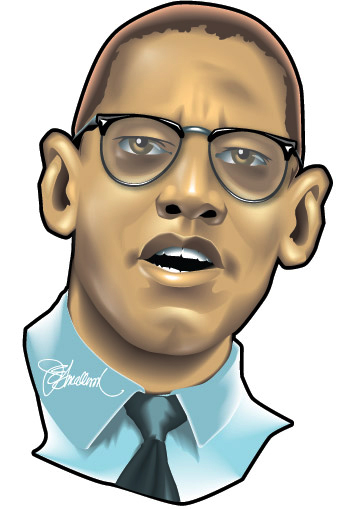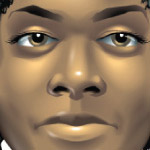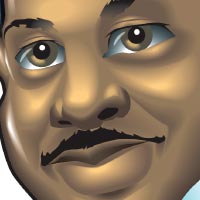
“Education is the passport to the future, for tomorrow belongs to those who prepare for it today.” |
|
|
 Malcolm X Malcolm X
(1925-1965)
— American Muslim Minister, Human Rights Activist
By The Staff
During his life, Malcolm Little embarked on a quest for truth that took him from the streets of Omaha, Nebraska, to the Nation of Islam, where he took the name Malcolm X, to make the hajj to Mecca, Saudi Arabia, the holiest city of Islam. Malcolm X became a prominent figure in the Nation of Islam and its most influential and dynamic orator.
One of seven children, Malcolm Little was born in Omaha on Tuesday, May 19, 1925, to Earl and Louise Little. His father, a Baptist leader and follower of social activist Marcus Garvey, instilled self-reliance and black pride in his children. He was also the local leader of Garvey’s Universal Negro Improvement Association (UNIA). Because of his UNIA leadership, he was seen as a troublemaker. The family was frequently harassed by white racist groups.
A streetcar accident?
In 1929, when Malcolm was 4, the family’s home burned down. His father blamed the Black Legion, one of those racist groups. In 1931, Earl Little was killed in what was called a streetcar accident. Malcolm was 6. Though never proving it, his mother, believed the Black Legion was responsible for her husband’s death. The suspicious circumstances regarding his father’s death would disturb Malcolm for years.
From age 14 to young adulthood, Malcolm hustled: breaking and entering, larceny and went to prison. While in prison, Malcolm began to study the teachings of the Nation of Islam. He changed his surname from “Little” to “X” to honor his unknown African ancestors. In 1958, he married Betty Sanders, who later became known as Betty Shabazz. They had six daughters.
�
Malcolm worked with the leader of the Nation of Islam, Elijah Muhammad, to expand the movement’s following. Mostly because of his efforts, the Nation of Islam grew from 400 members at the time he was released from prison in 1952 to 40,000 members by 1960.
Malcolm exhorted blacks to cast off the shackles of racism “by any means necessary.” “You don’t have a peaceful revolution,” he said. “You don't have a turn-the-cheek revolution. There’s no such thing as a nonviolent revolution.” Such proposals won him many followers and many critics. Martin Luther King, then a rising civil rights leader who advocated nonviolence, criticized what he viewed as Malcolm’s destructive demagoguery.
Malcolm left the Nation of Islam in 1964. The same year he traveled in North Africa and the Middle East, and made the hajj, the pilgrimage to Mecca, where he converted to orthodox Islam and took the name El-Hajj Malik El-Shabazz.
On Feb. 21, 1965, Malcolm X was about to give a speech at the Audubon Ballroom when three gunmen rushed the stage and shot him 15 times, killing him. He was 39.
|











